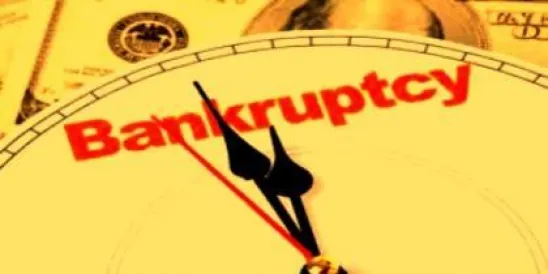Imagine that, as a creditor, you are about to collect on a money judgment following a lengthy trial; you've scheduled an impending foreclosure sale of real estate that is subject to your mortgage; or you are getting ready to complete a UCC sale of your personal property collateral. Suddenly, however, you receive word that your defendant/borrower/debtor filed a voluntary bankruptcy petition. Unfortunately, under these and similar circumstances, the automatic stay dictates that any action to recover on your claim against the debtor must come to an immediate halt.
What Is the Automatic Stay?
The bankruptcy equivalent of a temporary injunction, the automatic stay prevents all creditor activity to recover a claim against the debtor that arose before the commencement of the bankruptcy case. As one of the fundamental protections provided by U.S. bankruptcy laws, the automatic stay—covered under Section 362 of the Bankruptcy Code—has two primary purposes:
- To provide a debtor with a "breathing spell" from creditors by stopping all collection efforts, enforcement actions and harassment.
- To promote equitable distribution among creditors by forestalling a race to the courthouse.
The automatic stay is automatic upon the filing of a voluntary or involuntary bankruptcy petition commencing a bankruptcy case. No hearing is necessary and the stay is self-executing. Furthermore, notice is not required to subject creditors or other parties to the automatic stay.
While the scope of the automatic stay is broad, Section 362 lists eight general categories that are stayed:
- The commencement or continuation of a judicial, administrative or other proceeding against the debtor to recover on a pre-petition claim against a debtor.
- The enforcement of a pre-petition judgment against the debtor or its property.
- Any act to obtain possession of the debtor's property or to exercise control over such property.
- Any act to create, perfect or enforce a lien against the debtor's property, subject to certain exceptions, including mechanics liens.
- Any act to create, perfect or enforce a lien against the debtor's property for pre-petition claims.
- Any act to collect, assess or recover a pre-petition claim against the debtor.
- Setoffs of any pre-petition debt owing to the debtor.
- The commencement or continuation of a proceeding before the United States Tax Court concerning the debtor.
Section 362 applies only to affirmative acts against the debtor or its estate.
Scope and Longevity
The automatic stay is limited to protecting property of the bankruptcy estate, which is defined in Section 541(a)(1) of the Bankruptcy Code to include "all legal or equitable interests of the debtor in property as of the commencement of the case." The automatic stay does not apply to actions against property that belongs to neither the debtor nor the bankruptcy estate. Further, the automatic stay is not applicable to claims that arise after the commencement of the bankruptcy case.
The automatic stay against property, which is applicable to any person, estate, trust or governmental unit, continues in effect until the debtor's property is no longer property of the bankruptcy estate. The stay of other acts continues until the case is dismissed or, if the debtor is an individual, until the debtor is granted or denied a discharge.
Violations
Creditors need to be mindful of the imposition of the automatic stay. Any action by a creditor against a debtor taken in violation of the automatic stay is void and without effect.
A willful violation may result in a contempt judgment against the offending parties and their counsel. Furthermore, an innocent violation can become "willful" if the creditor fails to remedy the violation after receiving notice of the stay. Even in the absence of economic injuries, individual debtors may recover damages for emotional distress for violation of the automatic stay.
Obtaining Relief
The good news is that creditors do not need to sit idly by awaiting the conclusion of a bankruptcy case. Pursuant to Section 362(d) of the Bankruptcy Code, a creditor may apply to the bankruptcy court for relief from the automatic stay. While creditors can raise a number of grounds in support of a request for stay relief, the bankruptcy court will often grant relief for "cause," typically when the debtor lacks equity in property and the property is not necessary to an effective reorganization.
In a Chapter 7 liquidation case, situations in which a creditor seeks stay relief commonly arise where property of significant value (such as an automobile) is uninsured or otherwise subject to unacceptable risk; where property of significant value is depreciating rapidly and the creditor has reason to believe that the debtor will not surrender the collateral or reaffirm the debt; and where the creditor holds a lien on a debtor's residence and the debtor has defaulted on mortgage payments, cannot maintain continuing mortgage payments, or cannot cure payment arrearages.
In a Chapter 11 reorganization case, stay relief is often sought because of the delay between the filing of a Chapter 11 petition and the confirmation of a plan of reorganization. A secured creditor will also raise issues involving the time value of the funds that the creditor would realize on foreclosing on its collateral, or question the debtor's ability to successfully reorganize and pay the secured creditor's claim through a Chapter 11 plan.
Exercise Caution
Because the automatic stay is one of the most fundamental protections afforded to a debtor in a bankruptcy case, creditors must exercise caution in the enforcement of their claims. If there is doubt as to whether the automatic stay is applicable, a creditor should err on the side of abiding by the stay. Remember, the automatic stay is only temporary. If grounds exist, a creditor may seek and obtain relief from the bankruptcy court in a reasonably short period of time.



 />i
/>i

